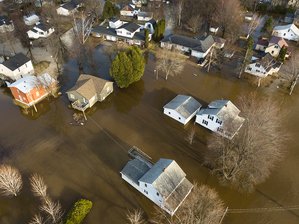
by Flagship Staff | May 7, 2019 | Blog
May is Motorcycle Safety Awareness Month. As the weather begins to improve, more motorcyclists will bring their motorcycles out of storage. If you’re a rider, this is an exciting time of year. If you’re a motorist, it’s important to be on the lookout.
Unfortunately, motorcyclist deaths occur 28 times more frequently than deaths of occupants in other vehicles. In 2017, 5,172 motorcyclists lost their lives. While deaths were down 114 people from 2016, it’s way too many.
While I don’t own a motorcycle, I do enjoy riding on two wheels. I enjoy riding my Trek bicycle and my Yamaha Zuma scooter. Both rides have me sharing the road with other motorists. Often motorists don’t see me even though I wear bright colors and have headlights and tail lights that are extremely bright during daylight hours.
Not all motorcycle accidents are the result of a collision with another vehicle. Animals, debris on the road, and not wearing a helmet can all contribute to injuries and death.
Here are some safety tips for motorists, as well as all two wheeled enthusiasts.
>Motorists
Double check your blind spots. Because of their speed and size, motorcycles may quickly come in and out of your blind spots. Always take a second look now that motorcycles are out on the road.
Assess your surroundings. Always be on the lookout when approaching intersections or making a left-hand turn. Covering the brake pedal is a good idea as you drive through an intersection.
Allow plenty of distance. Allow plenty of distance between you and a motorcycle when braking. A motorcyclist may not always use their breaks when decelerating. They may be decelerating by down shifting or simply letting off the gas.
Watch out for flashing turn signals. Turn signals on motorcycles may not be self-canceling and the motorcyclist may have forgotten to turn it off. Wait to be sure the rider is going to turn before you proceed.
Know and follow the laws. Safe passing laws require a motor vehicle to allow no less than three feet of clearance when passing a bicyclist. The Dooring law states that a person in a parked car DOES NOT have the right to open the door at any time. A driver or passenger may only open a door when it’s reasonably safe and doesn’t interfere with the movement of traffic.
Watch for road debris. Especially right after winter, road debris is a big concern. There can be a build up of salt and sand on the side of the road if you haven’t had a good, steady, heavy rain in your area. This could result in slippery conditions.
Watch out for potholes. After a brutal winter, potholes can be found in new places. Hitting one could send you flying or severely damage your motorcycle.
Wear a DOT compliant helmet. You’re much more likely to sustain major injuries in a traffic collision if you don’t wear your helmet. Wearing it always when operating a motorcycle is crucial.
Watch for animals. If you’re riding after dusk in the country or through wooded areas, consider reducing your speed. Hitting an animal at a high rate of speed can send you flying. In addition, never swerve to miss striking the animal. This can put you in the lane of oncoming traffic or driving towards a tree. Brake as hard as you can until impact.
Navigate turns cautiously. Accidents are very common on curves and bends in the road. Pay attention to signs warning of curves and slow down to the suggested speed limit.
Pay attention to the weather. Always be aware of weather changes. Rain can make the pavement slippery. If you add leaves to the mix, pavement conditions can be extremely dangerous. Poor weather conditions can also make it difficult for other motorists to see you.
Drive in the left side of the lane. Driving here helps you to be more visible to motorists.
Bicyclists
strong>
Make sure your bike is in proper working condition. This means making sure bolts are tight, brakes work, chains are lubed, and tires are inflated to the manufacture’s recommend tire pressure.
Consider buying some accessories for your bike. Accessories can make your commute to work safer and more enjoyable. A mirror, bell, headlight, and taillight are very important accessories. All of them help you navigate and safely manage your surroundings.
Obey all traffic laws. It happens all too often that bicyclists are seen running stoplights or riding on the wrong side of the road.

by Flagship Staff | Apr 30, 2019 | Blog
Warm spring days are a nice preview of what’s to come as we approach summer. However, spring weather is also very unpredictable. Temperatures fluctuate between warm and cool. A stretch of nice sunny days can be followed by wet stormy days. Lightning, wind, rain, and hail can cause damage to your property very quickly.
According to Tom, West Bend claims manager, storms can damage things on your property that you may not normally think about. When Mother Nature damages items such as decks, fences, swimming pools, hot tubs, piers, and docks, claims payments made in accordance with the policy can be confusing. Depending on if an item is considered a separate structure or part of a building determines if the claim payment will be made on an actual cash value (ACV) or replacement cost value (RCV) basis.
Before delving into different claims scenarios, it’s important to understand the difference between actual cash and replacement cost value.
Actual Cash Value (ACV)
Actual cash value is an amount of money that’s paid to a policyholder after a loss or damage to insured property. The calculation is made by subtracting depreciation from replacement cost. Depreciation is calculated by determining the expected lifetime of an item and calculating what percentage of the life remains.
Replacement Cost Value (RCV)
Replacement cost is an amount of money that’s paid to a policyholder after a loss or damage to an insured property. This amount of money is based on what it would cost today to replace an item or structure back to its pre-loss condition.
Now that you understand these claim payment options, here are some common claims scenarios that are handled by our Claims department.
Claim Scenario #1
You’ve finally purchased the home of your dreams. It’s in a quiet subdivision and it has a detached white picket fence. The backyard has several lovely shade trees, but they still allow sunlight into your pool. The pool is surround by a nice wooden deck that’s attached to your home. Also, sitting on the deck is a hot tub. You can’t wait for summer to arrive so you can invite your friends and family over for a pool party. Unfortunately, just before summer, a severe storm goes through your neighborhood. Not much remains of your white picket fence. Your pool and deck are severely damaged by one of your large shade trees. Thankfully you have an insurance policy with adequate coverage limits. A claim adjuster has visited your property and has determined the following claim payments.
Item
ACV
RCV
Claim Payment
Detached white picket fence
$3,000
$5,000
$3,000
Swimming pool
$5,000
$10,000
$10,000
Wooden deck
$4,000
$7,000
$7,000
Hot tub
$5,000
$10,000
$10,000
Your total claim payment from this storm is $30,000.
Claim Scenario #2
You’ve just purchased a home in the country on several acres of land. There are no neighbors in sight. Nothing but fresh air and peace and quiet. Your yard includes a fence that’s attached to your home. All you must do is open your patio door and your dog, Rosie, can go out and play. Away from your home you have a large above ground swimming pool. And after a hard day’s work, you really like using the hot tub just off the wooden deck on a separate concrete patio. Unfortunately, a warm spring day finished with a severe storm that damaged your property.
Again, you have an insurance policy with adequate coverage limits. A claim adjuster has visited your property and has determined the following claim payments.
Item
ACV
RCV
Claim Payment
Chain link fence
$3,000
$5,000
$5,000
Swimming pool
$5,000
$10,000
$5,000
Wooden deck
$4,000
$7,000
$7,000
Hot tub
$5,000
$10,000
$5,000
Your total claim payment from this storm is $22,000.
Insurance Coverage
In both scenarios above, the actual cash value and replacement cost value numbers are the same. However, the claim payment made in each is different. The differentiation is based on if the item is attached to your home or not. If it’s not attached to your home, it may be considered a separate structure. Separate structures that aren’t buildings are covered on an actual cash value basis.
In Claim Scenario #1, the hot tub is considered part of your home because it’s sitting on the deck which is attached. In Claim Scenario #2, the hot tub is on a concrete patio which isn’t attached to your deck. Therefore it’s considered a separate structure and the claim payment is made on an actual cash value basis.
Regarding the swimming pools, neither one of them is literally attached to the home. However, in Claim Scenario #1 the pool is surrounded by a wooden deck that’s attached to the home. Therefore, the claim payment for the pool is made on replacement cost value basis. The pool in the country is a separate structure so the claim payment made is based on actual cash value.
Lastly, claim payments for the fences are different too. In Claim Scenario 1, the white picket fence isn’t attached. In Claim Scenario 2, the fence is attached so Rosie can go outside and play.
So, you think you’ve got it figure out?
Claim Scenario #3
After 40 years of work you’ve decided to retire and buy a home on a beautiful lake. After researching a variety of docks, you decide to purchase a dock that must be taken out of the water before it freezes each year. Your neighbor’s dock is permanent and is made to withstand snow and ice. After a crackle and boom on the 4th of July a severe storm pushes through the area. Fallen trees severely damage your new dock, as well as your neighbor’s. Again, you have an insurance policy with adequate coverage limits. A claim adjuster from your insurance company has visited your property. A claims adjuster from Insurance Company B has visited your neighbor’s property.
Item
ACV
RCV
Claim Payment
Your dock (Your insurance co)
$10,000
$20,000
$20,000
Neighbor’s permanent dock (Ins Co B)
$10,000
$20,000
$10,000
Insurance Coverage
In Claim Scenario #3, the payment for each dock is different. You’re probably wondering why because they’re both separate structures and not attached to a building. Because your dock is stored on land during the winter months, it’s considered personal property making it eligible for replacement cost value.
Final Thoughts
Insurance isn’t fun to buy and can be difficult to understand. Hopefully understanding actual cash value and replacement cost value makes the claims process easier to understand. Finding out how items are covered after a loss isn’t a good situation for you or your insurance company.
At a minimum, talk to your independent agent on a yearly basis to review your insurance policy.

by Flagship Staff | Apr 16, 2019 | Blog
Now that spring’s here, it’s time to give your home a post-winter scrub down. While it feels great opening the windows and letting the fresh air in, there’s much more work to do. Besides your regular house cleaning, here are some things that often get overlooked or forgotten.
1. Carpet. In our home, my wife and I frequently vacuum as a part of our normal cleaning routine. It’s unbelievable how much dirt, dust, and debris are in the container after we’ve finished. If you have a pet, you’ll notice even more.
Now that nicer weather’s here, it’s a great opportunity to deep clean your carpets by yourself or by hiring a professional. If you think about where your shoes travel, you may move this up on your “to-do” list. If you choose to hire a professional, consider:
Asking friends or neighbors for referrals;
Researching companies in your area;
Contacting the Better Business Bureau;
Understanding the services offered;
Getting the contract in writing; and
Confirming the company you select carries insurance.
2. Base boards. Have you ever looked behind your entertainment stand? If so, you probably found a significant amount of dust on the base boards. Or how about your kitchen base boards? Do they have food particles or spilled juice on them? Now’s a good time to wipe down all the base boards in your home.
3. China cabinet. Have you gone through your china cabinet lately? My guess is, probably not. We recently updated our kitchen. As part of the process, we went through ours. Not only was the glassware full of a thick layer of dust, and the silver tarnished, there were many items we haven’t used in a long time. With wedding season right around the corner, now’s the time to purge. Consider donating your unused items to local charities or collection centers.
4. Dryer vent/lint trap. Between 2010-2014, U.S. fire departments responded to approximately 15,970 home fires that resulted from dryers or washing machines. Lint is extremely flammable and can cause a fire in your home resulting in significant damage. To prevent this from happening to you, consider cleaning your dryer vent and ducts at least once a year. If you can’t easily do this, consider hiring a professional. Your lint trap should be cleaned before or after each load.
5. Blinds. While, we clean every week, our blinds are neglected. We open and close them every day but fail or pretend not to see the dirt and dust. Look at yours. I’ll bet you’ll be surprised on how dirty they are. And don’t forget about your curtain rods.
6. Windows. Rather than wait for the flies to come back to life, clean your window sills and the screens if they’re dirty.
7. Bathroom vents. Bathroom vents are important for removing the steam from your bathroom after a nice, hot shower. However, over time they become covered in dust. Wipe them down with a damp rag or use your vacuum.
8. Light fixtures and ceiling fans. Ah, the first warm day has arrived. You decide to turn on your ceiling fan for some circulation, and dust starts flying everywhere. Enjoy your first warm day by cleaning them now.
9. Shower curtain/liner. Bathrooms are very conducive for mold growth. If your shower curtain has changed from white to pink, red, black, or dark green, you’re growing mold. Now’s the time to buy a new one.
10. Light switches, door handles, and hand rails. It’s always good to sanitize these items after you or a family member have been sick. If time hasn’t previously allowed you do this, add it to your list.
Cleaning hacks
Here are some cleaning hacks for tackling other areas of your home.
Clean your dishwasher with vinegar.
Use lemon to remove watermarks on your shower doors.
Remove grease build up on your kitchen cabinets with soap.
Remove pet hair from surfaces with a rubber glove or squeegee.
Clean your windows with old newspaper.
Descale your shower head and faucets with vinegar.
Microwave a bowl of lemons and water or cider vinegar to get rid of tough odors and stains.

by Flagship Staff | Apr 2, 2019 | Blog
After a long, cold winter, many of us yearn for the transition to spring. More daylight, chirping birds, increased outdoor activity, and the start of Major League Baseball are all signs that we’re getting closer to warmer days.
Unfortunately, as we make the transition, melting snow and spring rains have led to serious flooding in many parts of the country. While many people worry about losing their home to fire, water damage is one of the most common homeowner claims.
If a flood consumes your neighborhood or your sump pump fails and your home fills with water, do you have the right insurance coverage in place to fix the damage?
Below are some water damage claims that may impact your home. It’s important to understand each one so you can make sure you have the right insurance coverage in place.
Flood
Spring thaws combined with several inches of rain can cause your community to flood quickly. If you have a river nearby, the situation can escalate even more. According to the Federal Emergency Management Agency (FEMA), flooding is the most common and expensive natural disaster in the United States.
A standard home insurance policy doesn’t provide coverage for damage caused by a flood. If your home is in a community that participates in the National Flood Insurance Program (NFIP) you may be eligible for flood insurance through the federal government. Some private insurers may also provide coverage.
NFIP coverage for a single-family home can provide coverage limits up to $250,000 dwelling coverage and $100,000 on contents. If you’re a renter, you an get coverage for up to $100,000 on contents.
The waiting period for an NFIP policy is 30 days. So, trying to buy a policy just before a big storm hits your neighborhood won’t provide you with coverage.
Sump pump overflow
In March, April, and May, West Bend’s Claims department sees an influx in sump pump claims. Because our sump pumps work hard this time of year, it’s important to make sure they’re in proper working order. While I’m always thankful when I hear my sump pump run, I’m also always a bit nervous because I know water is an issue.
A standard insurance policy may not provide coverage for sump pump overflow. A West Bend policy provides coverage only if you choose it. It’s not automatically provided.
Sewer backup
Sewer backups can occur in your home due to:
Tree roots growing in sewer pipes;
Deteriorated sewer pipers; and
Problems with your municipal sewer system.
Depending on how your city sewer system works, too much rain water can overload the system causing the water to backup into your home. The backup may not occur just at the drain in your basement, it can come through your sinks, toilets, or bathtubs. If you have a black stinky water coming from these areas in your home, contact your local municipality and your insurance agent or company. If you have insurance coverage, a restoration company should clean up the mess. Black water is contaminated and can contain fecal matter and bacteria.
Like sump pump overflow, a standard insurance policy may not provide coverage.
Household leaks
Common household leaks include a burst water pipe or leaking appliance. If you have a water leak in your home, find and close the shutoff valve immediately to prevent further damage. If the shutoff valve near your appliance or plumbing fixture doesn’t work, shut off your water main coming into your house. Depending on your situation, timing is crucial. To find your water main quickly, consider attaching a West Bend Water main tag. To request yours, click here.
Coverage for this type of damage is usually provided in a standard homeowners policy.
Insurance isn’t fun to buy and can be difficult to understand. Focusing and buying a policy simply on price may leave you with serious coverage gaps. It’s up to you to talk to your independent agent to determine if your policy has any coverage gaps and what’s the appropriate amount of coverage for your home. Finding out during the claim process that you don’t have proper or adequate insurance coverage isn’t a good situation for you or your insurance company.

by Flagship Staff | Mar 27, 2019 | Blog
If winter 2019 was your first winter with a teen driver, you’re probably relieved spring is here. Hopefully no more ice, sleet, snow, or whiteout conditions.
However, no matter what the season, it can be tricky for young drivers. Springtime driving challenges can include:
Potholes;
Deteriorated windshield wipers;
Hydroplaning; and
Orange constructions barrels.
Here are some things to watch for and to discuss with your teen driver(s).
Potholes
Potholes can cause significant damage to your car if your teen driver hits them straight on. This can include damage to your tires, rims, suspension, exhaust system, and steering.
All drivers should be leery of what’s hiding under a puddle of water. Always try to steer around a large puddle if you can safely do so. Never swerve as this could put you in the path of an oncoming car.
Windshield Wipers
Windshield wipers are a critical component, but they’re often neglected. They take a beating from the sun, cold, snow, and rain. Make sure you change the windshield wipers on your cars every six months. Doing this ensures the best vision possible.
Hydroplaning
During rainy conditions, hydroplaning can occur. Hydroplaning is a function of speed, inadequate tire tread, and standing water. Hydroplaning occurs when water on the road causes your tires to lose contact with the road. This loss of contact results in a loss of steering and braking.
Check your car’s tires to make sure they have adequate tread to push the water away from the tire. Also, never use cruise control on a wet surface.
Road Construction
In Wisconsin, orange road construction barrels have started making their way onto our freeway system. It’s important to obey reduced speed limit signs to keep the construction workers safe. In addition, it’s important to watch for changing traffic patterns.
Road America’s Teen Driving School
To improve your teen drivers’ skills and help learn how to safely navigate around springtime challenges, consider enrolling them in Road America’s Teen Driving School sponsored by West Bend. Road America’s Teen Driving School is an advanced driving school that focuses on skills not taught in driver’s education. Skills include:
Skid prevention and control – Teaches how to react and handle a car if you lose control.
ABS vs. threshold braking – Teaches the difference between the two and how to effectively use ABS brakes. Never pump ABS brakes!
Collision avoidance maneuvers – Teaches how to make aggressive lane changes while keeping your car in control.
Proper vision skills – Teaches where to look, proper mirror use, and viewing traffic situations from a distance.
This program is offered several times during the year at Road America in Elkhart Lake, WI and runs from 9:00am to 4:00pm CST.
2019 Dates
Saturday, April 13
Saturday, May 4
Sunday, August 18
Saturday, October 26
Sunday, October 27
Saturday, November 2
Sunday, November 3
If you don’t live in the area, consider finding an advanced driving school near you or visit Road America in Elkhart Lake, Wisconsin. I’m sure you’ll enjoy it.





